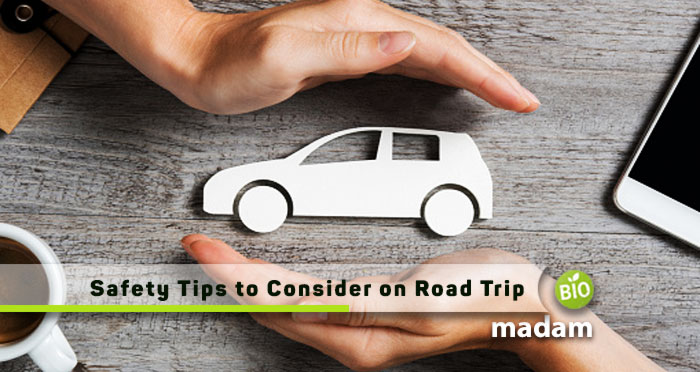Recently updated on August 29th, 2022 at 09:07 am
Family road trips can be a great opportunity to bring everyone closer together and get to know each other better as you go about your adventures. You’ll all be in the car and have plenty of time to talk about recent events and make plans for the future.
Even with all the fun and games, we can’t ignore the fact that a long road trip with the kids in the backseat can be, at times, very stressful, and you, like any good parent, want to keep everyone happy and safe.
We want to help, so we’ve listed out the most important things you should pay attention to so you can have “smooth sailing” all the way to your destination.
Have Your Car Checked by a Qualified Mechanic
You have to place your trust in your car every day, as you’re going to work, running errands, or driving back home in the evening. But when you’re on a long-distance trip with your family, you definitely want to minimize the chances of something going wrong. Even if you avoid any accidents, you’ll still end up waiting by the side of the road for hours until you can get some assistance.
Do yourself a favor and have a mechanic check your tires, wheel alignments, battery, suspension, fluids, belts, and air conditioner. Most probably, you’ll have to make the appointment several weeks before you leave so plan accordingly.
Even after tuning up your car, it wouldn’t hurt to pack some jumper cables or jump starter battery since your kids might forget the light on in the back of the seat and you’ll probably be charging your electronics on the go.
Nowadays, not all car models come with a proper, full-size spare wheel, so yours might be equipped with a “space saver” wheel which you have to drive at a maximum of 50mph while you’re looking for a place to fix your tire, or with a tire repair kit. We would advise you to play it safe and pack a normal-sized spare wheel, but if you don’t have the space, you should at least be certain you know how to use the kit and you may want to consider subscribing to a roadside assistance plan as well.
Plan Your Route

Since you’ll need to take breaks to get something to eat, go to the bathroom and keep the kids from going crazy, it makes sense that you plan an itinerary so you know where you could stop. We have become very reliant on tech tools like a GPS but it would be wise to also pack some maps and a printed version of your route plan, just in case.
You could also plan a stop or two somewhere interesting for the little ones, you get to take a break from driving and they’ll have something nice to look forward to and an incentive to be nice until you get there. Research some decent hotels and restaurants so you have several options to choose from.
Pack an Emergency Kit
It’s highly recommended that you include an emergency kit in your luggage. It should include not only a first aid kit and medications but also some water bottles, warm blankets, a flashlight, batteries, flares, a tool kit, and an extra fully charged cellphone or power bank, maybe even a note with emergency contact numbers because most of us don’t know them by heart anymore. On top of that, if you want to keep your sanity, you should load up the iPad with movies and games (give them headphones), get some pillows, blankets, snacks sufficient ounces of water, and maybe some stuffed toys.
Wet wipes are very useful for quickly cleaning up any unexpected messes the kids might cause. In case you get distracted and forget your car key inside, consider keeping a spare one on you or giving it to your co-driver.
Don’t forget that in case something happens you’ll need to have important documents like IDs, proof of insurance, and additional medical documents if some members of your family have chronic health infections or diseases.

Make Sure You’re Well Rested and Able to Focus on the Road
According to the NHTSA (National Highway Traffic Safety Administration), More than 20,000 people died in road accidents in the first 6 months of 2021, 20160 died in crashes (18.4% up than 2020). It’s very important that you’re able to stay alert while you’re driving so the night before, you ought to avoid drinking any alcohol and try to go to bed early so you can get at least seven hours of good quality sleep.
On the road, take a break every two hours or switch drivers. Refrain from talking on the phone while you’re driving, even if it’s hands-free. Activity in the part of your brain that processes moving images has been shown to decrease by up to 30% while you’re listening to the other side of the line.
Road trips are especially popular during summer when Americans plan trips to California, Las Vegas, Miami and some visit their parents in Florida. If that’s the case for you, be aware of the fact that Florida is among the states with the highest rate of car accidents per year. Hopefully, nothing of that sort will happen, but if it does and you get the impression that the other driver or their insurance company are being unfair to you, it’s best to just search for car accident attorney west palm beach and see if you can get some help conducting negotiations.
Are We There Yet?
Well, asking this question is one of the least annoying things kids do when they get bored on a road trip. They’ll get whiny and antsy, bicker with their siblings, distract you, throw things around, and do all sorts of fun activities.
Before you set off, you’ll want to check the backseat for any choking hazards like loose change, secure the child safety seat, and test the seatbelts. On top of that, if you want to keep your sanity, you should load up the iPad with movies and games (give them headphones), get some pillows, blankets, snacks, water, and maybe some stuffed toys. Anything that will keep them busy and your co-driver will have to be on duty for making conversation, answering any mind-bending questions, and whatever else they might need.

Meet me; I am Paulina Zaniewska, who’s more hooked on providing the best health blog. I’ve always been so determined to compete as a nutritionist, and here I am, done with a Master’s in food technology. My brilliant performance throughout encouraged me to help people.

